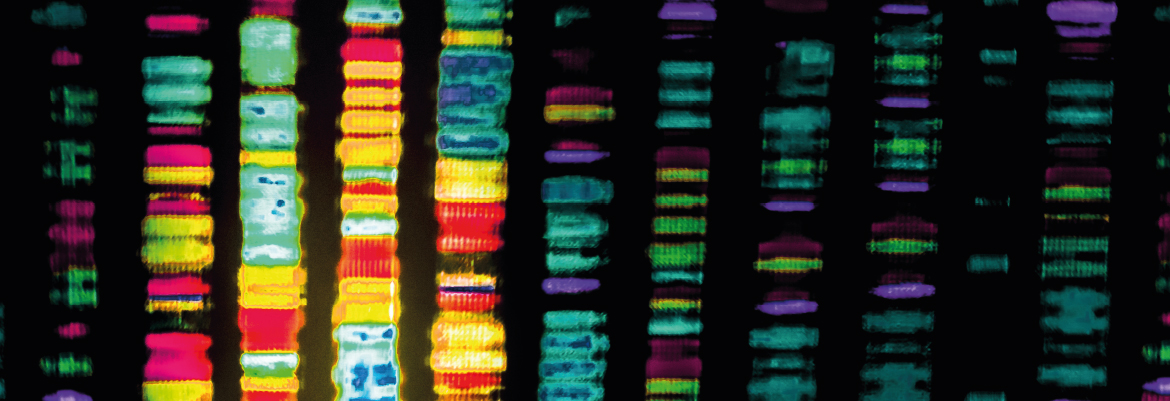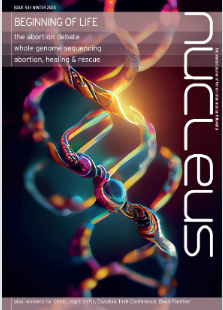You may have heard of Whole Genome Sequencing (WGS). You may be wondering what the words mean. Is it an exciting new way to improve health and wellbeing, or is it a modern tower of Babel? [1] This article aims to help us understand WGS to better think about what it means for us as Christian medics.
what is whole genome sequencing?
Our genome is the body's set of genetic information, including over 20,000 genes. It is present in nearly every cell in the body. We all have differences in our genomes — for example, each genome typically contains 2,100 to 2,500 structural variants.[2] These are missing, duplicated or rearranged sections of the genome. Many variants are simply benign human variations and make us individuals. However, some changes can affect the functioning of genes and cause health and/or developmental problems.
WGS aims to sequence all of someone's DNA as far as the technology will allow. Historically, genetic testing would generally involve only sequencing the relevant gene(s), or at most a 'panel' of genes associated with certain presentations or phenotypes. With WGS, the patient's whole genome is sequenced, but an NHS laboratory would only look at the relevant sections (ie panels of genes). Since early 2021, the NHS in England has introduced WGS for many indications. [3] There is also a 'Paediatric Disorders' super-panel which (at the time of writing) tests for 2,067 genes. [4]
Where possible, a trio should be used for WGS. This means testing the patient and both biological parents, which helps us identify variants and understand the likely pathogenicity of any variants found.
WGS is moving into many specialties and will become increasingly familiar to many clinicians. Rapid WGS in neonatal and paediatric intensive care settings has the potential to provide treatment-altering diagnoses far more quickly than previously. [5],[6]
why now?
The rollout of WGS followed the success of the 100,000 genomes project launched in 2013, which found diagnoses in 25 per cent of recruited cases with rare diseases and no genetic explanation. [7]It is becoming much cheaper to sequence the whole genome, although in reality, it would be an overwhelming task to analyse it fully. Bioinformatic pipelines and filters (computer algorithms) are applied to enable meaningful data processing. WGS is a platform to allow testing — the whole genome may be processed relatively quickly and cost-effectively, but the whole genome is not currently being analysed as part of NHS testing in the UK
The NHS Long Term Plan introduced many commitments around genomic medicine in England, including to be 'the first national health care system to offer whole genome sequencing as part of routine care' and an aim to 'sequence 500,000 whole genomes by 2023/24'. [8]
consent
With WGS testing, 'fully informed' consent may not be possible. [9] Findings may be complex, uncertain or unexpected. The NHS in England uses a 'Record of Discussion' [10] for documentation rather than a 'consent' form. We can't list all 2,000+ conditions that a paediatric disorders panel covers, but we can communicate types of situations such as uncertain/incidental findings.the National Genomic Research Library and 'big data'
The same Record of Discussion form documents a discussion around the (English) National Genomic Research Library (NGRL). [11] This is part of Genomics England, a wholly-owned subsidiary of the Department of Health and Social Care. If patients agree, the whole of their genome would be added to this resource — even though the NHS laboratory would not look specifically at the whole genome.The NGRL keeps WGS data and can link this to the patient's wider primary and secondary care NHS records, including admissions, scans, and problems unrelated to the diagnosis. This data is kept beyond death. Because a person's DNA code is unique to them, their identifying demographics are not stored directly with the data — referred to as 'de-identifying'.
The patient information leaflet states:
Genomics England always protects your data and controls who has access to it…Approved researchers may work for not-for-profit organisations…and for-profit (commercial) companies such as drug or technology companies. [12]
potential impacts for patients (not unique to WGS):
- a label for their condition
- access to relevant patient support groups
- personalised letters for school, allowing access to funding/support
- a better understanding of prognosis
- screening (where there are known other features of the condition)
- recommended treatments for a small proportion of genetic conditions
- access to research
- reproductive 'options', eg, natural pregnancy, adoption, [13] donor gametes, invasive or non-invasive testing in pregnancy, [14] pre-implantation genetic diagnosis [15]
- predictive testing for family members (in cancer predisposition syndromes, this may enable early access to screening)
- possibility of future treatments
challenges (not unique to WGS):
incidental findings
There may be incidental or unexpected findings from WGS. This may be from genes within a large panel. Or in some cases, a tool such as the Exomiser may identify pathogenic variants outside of the panel of genes applied. Recent examples include adult-onset neurological disorders or cancer predisposition genes found when testing children. Incidental findings may also have implications for other family members. [16]There are American guidelines on which incidental findings should be reported — including adult-onset cancer predispositions such as BRCA1/BRCA2/Lynch syndrome. [17] UK discussions are ongoing about what should be reported.
variant classification and uncertainty
Classification of genetic variants is an evolving field. Variants may be classified as benign, likely benign, a variant of uncertain significance (VOUS/VUS), likely pathogenic, or pathogenic. UK laboratories use American [18] and UK guidelines [19] to assign pathogenicity. These guidelines undergo updates, so 'likely pathogenic' variant can be downgraded to a VUS and vice versa.VUSs can cause great difficulty for patients; clinicians may not be able to advise if they think the variant is significant. Further information (such as family segregation studies or research) may enable re-classification, but patients may be left with uncertainty. This can be difficult for them, their families, and decisions about having children. VUSs may be more common in ethnic groups that have historically been less well represented in genetic testing. [20],[21]
revealing biological parentage
Because a trio would ideally be used (comparing sample to mum and dad), misattributed parentage can be identified. This unexpected information can cause complex ethical dilemmas and may not be disclosed if it is not relevant to the patient's care.reproductive options
Couples may face challenging decisions about reproduction if they know their genetic status. This may feel empowering for some, whatever their views on prenatal testing. Pre-implantation genetic testing involves discarding affected embryos. Testing in pregnancy is particularly offered when a person plans to have an abortion if the baby is affected. For those of us who value life from the moment of conception, [22] these options can be particularly concerning.other challenges
There are many other challenges. How do we remind people that everyone is equal, regardless of genetic condition? What might be the future impact on insurance? How do we prevent any new societal inequalities from arising? How should big data be used? Can WGS data security be guaranteed in this era? How do we safeguard against a Gattaca-style [23] future where society categorises individuals on their genetic composition (polygenic screening of embryos is already available in the US)? [24] Should Genomics England be permitted to receive fees for the use of patients' data when for-profit companies conduct research? Should patients be asked for consent for research that is so closely linked to diagnostic testing?There are also issues around equity within the devolved nations of the UK; the NHS Long Term Plan's WGS aims relate to England only. And despite the decreasing costs of WGS, this is still beyond the reach of resource-poor countries.
applying the Christian worldview
God created human beings in his image [25] and God knows us even before we are formed in the womb. [26] However, Scripture also tells of the fall [27] and that humanity is marred by sin. [28] The genomes of humans and other organisms have become corrupted, leading to death, disease and decay. Yet through Jesus we have an eternal hope because he will return and, on that day, 'there will be no more death or mourning or crying or pain, for the old order of things has passed away.' (Revelation 21:4) Whilst we have a responsibility to care for our bodies, this must be balanced with not becoming preoccupied with the search for future risk of disease or genetic perfection, or believing that our identity lies in our genome.Genetic conditions vary widely in the nature and severity of their effects. Many genetic conditions can cause great pain and suffering — both to the patient and to their loved ones. Families can experience feelings of guilt, fear for the future, and concern about other children or family members. Like Jesus, we must express compassion [29] and walk with people who face these experiences.
As with many technologies, genetic testing, including WGS, can be used for great good. For example, WGS can help reach a relevant diagnosis for the patient. However, it can also be used for purposes which many of us would regard as potentially harmful, such as testing a fetus for the presence of a condition to decide whether to end a pregnancy. We are all one in Christ Jesus, [30] regardless of status or disability. [31] If we believe that life matters from the moment of conception, then life should still matter even if affected by a genetic condition. However, these decisions are highly emotive and complicated for families. God calls us to defend the rights of the vulnerable. [32] Jesus perfectly exemplified how to be both sensitive and compassionate, and not to compromise on sin. [33] The challenge for Christians is to do the same, whilst protecting these most vulnerable of people.
We are also called to seek justice. [34] If individuals' ability to access insurance or healthcare were affected by their genetic blueprint, or if the most genetically 'superior' embryos were chosen, this would introduce further inequalities into society. We must take care to safeguard against inequity and inequalities.
Understanding more about the genome may give us helpful insights into aspects of human health and disease, both on an individual level but also on a societal level. Big data can be beneficial for the health of the nation — such as through the identification of modifiable risk factors for illness. But big data can also be used for commercial gain or other harmful purposes. There is so much that we do not yet understand about the genome. The Tower of Babel [35] reminds us that when we seek to make a name for ourselves and build something monumental, we must carefully consider if this actually aligns with God's will.
































